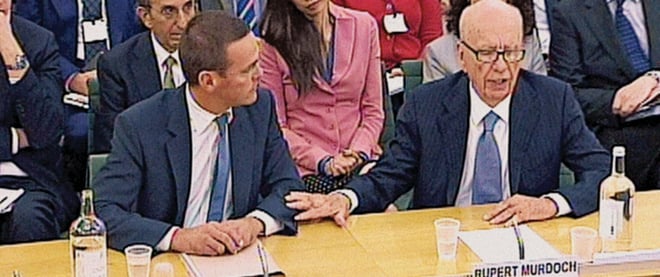Murdoch’s maelstrom
Under investigation in the U.K., Rupert Murdoch may well find that his toughest test will be in the U.S.
PA/AP
Share

It was around the time the body turned up that the saga began to feel a little less Shakespearean and a little more film noir. The ever-evolving News of the World scandal was already epic in scope. It had claimed careers and tainted politicians. It had a movie star and a murdered child, and at its heart, of course, it had the king himself, Rupert Murdoch, clinging to his empire as the hordes—the shareholders, the police and the reporters—pecked away at its ever-more ragged borders. But with the death of Sean Hoare, one of the original whistleblowers in the whole affair, the News Corp. hacking scandal seemed to move in another direction.
Hoare was a one-time celebrity reporter at News of the World. He went public with allegations of widespread hacking at his old job as part of a New York Times investigation last year. He later promised more revelations to come. Instead, police found Hoare dead in his home on July 18. There is no suggestion that his death was criminal. Police were treating it as unexplained, but not suspicious, Agence France-Presse reported. But the moment seemed to push the hacking scandal into a slightly different realm, one where anything could happen and nothing would surprise.
The Guardian first revealed in early July that News of the World had illegally accessed the voice mails of Milly Dowler, a young murder victim. The scandal has rippled outward ever since. First the paper itself was shut down, then the head of its British parent company and former editor, Rebekah Brooks, a Murdoch favourite, resigned. Within weeks, two of England’s top police officials had stepped down over the affair, as had Les Hinton, the chief executive of Dow Jones, the News Corp. subsidiary that publishes the Wall Street Journal.
By the time Murdoch appeared before a British parliamentary committee on July 19, rumours of the once improbable were rampant. For the first time since a debt crisis rocked News Corp. in the early ’90s, the Murdoch family’s grip on their media empire appeared to be slipping. In the New York Times, David Carr wondered whether Murdoch would have to make “an Abraham-like sacrifice and abandon his son James,” the head of News Corp.’s European and Asian operations. Bloomberg, meanwhile, reported that News Corp. itself was considering replacing Rupert Murdoch as CEO. The company’s shares dipped following the Dowler scoop, and Standard and Poor’s, the rating agency, was reportedly considering downgrading its debt over “business and reputation risks.”
There were few signs, meanwhile, that the spotlight would shift away from the scandal anytime soon. By one count, there are already 10 separate investigations announced or under way into the hacking issue. In Britain, Parliament, the police and an independent judge are all examining the affair. But for Murdoch, Australian-born but an American citizen, the most serious probes may be those launched in the United States.
News Corp. journalists have been accused of trying to obtain phone records and voice mails that belonged to victims of the Sept. 11 attacks. The FBI has opened an investigation into those allegations. Testifying before the British Parliament, Murdoch said he had seen “no evidence” to support the charges. But few issues needle the American psyche like 9/11. Should the accusations prove true, the PR blow alone could be fatal to the firm.
Equally dangerous could be an investigation under the Foreign Corrupt Practices Act. Since the 1970s, it has been illegal for American companies to further their business goals by bribing foreign officials. News of the World journalists and private investigators in their employ have been accused of paying off British police for access to phone records. But because News Corp. itself is registered in Delaware, some analysts believe the company may still have violated American law. Eric Holder, the U.S. attorney general, has said his department is looking into the issue, although experts differ on how much success he’ll have making anything stick.
The hacking scandal has also shone a light on some of News Corp.’s less appetizing business practices. According to a New York Times report, the company has paid hundreds of millions of dollars to settle civil suits in recent years. Among the accusations News Corp. paid to have go away: that they once hacked into a competitor’s computer system to gain an advantage.
It was against this backdrop that the Murdochs, Rupert and James, appeared before the British parliamentary committee. The elder Murdoch admitted his company had “dirty hands,” but he blamed his competitors for building “a hysteria about it.” When asked directly if he felt responsible for the scandal, he was succinct. “No,” he replied. A few minutes later, a man struck him with a shaving-cream pie—another bizarre twist in the scandal. As onlookers stepped toward the man, Murdoch’s wife leapt up and struck him with an overhand right. It was the best shot any member of the Murdoch clan landed all day.